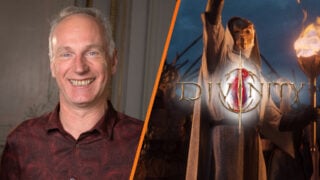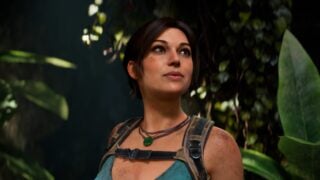Interview: Why Mafia The Old Country is returning to the series’ roots
Hangar 13 president Nick Baynes and game director Alex Cox explain what’s new, and what’s old

One of the most impressive trailers shown during The Game Awards this year was for Mafia: The Old Country.
The first entirely new Mafia game in nine years, The Old Country takes both the series and the story to its roots by setting the game in Siciliy in the early 1900s.
While Mafia 3 was generally well-received, its late ’60s New Orleans setting gave a very different vibe to its predecessors, and while it had fans others felt it didn’t quite match the mob movie image the ‘Mafia’ name usually conjures up for some.
The same certainly can’t be said for The Old Country, which appears to take The Godfather Part II as its main inspiration and should have players practicing their best Pacino, Brando and De Niro impressions.
A few days before The Game Awards kicked off, VGC sat down with Hangar 13 president Nick Baynes and the game’s director Alex Cox to have a look at the trailer and chat about the decision to bring the series back to the Mafia’s roots.
As enjoyable as the whole Mafia series is, I think the word ‘Mafia’ immediately conjures up images of The Godfather and the like for many people, and that may have been why some didn’t feel like Mafia 3 fit tonally with the rest of the series. Was this what led to the decision to go to Sicily for the fourth game?
Alex Cox – I don’t think it’s a reaction to Mafia 3 in any way. Every Mafia game is exploring a different era, let’s say, of organized crime – the 1920s, 1930s, etc. I think we pretty much do 50% of the 20th century.
So for lots of different reasons, we wanted to go back to the start with Mafia: The Old Country. It’s a new engine. It’s a new era for the franchise. We thought it was really good to go back to the beginning.
And like with the other eras we’ve explored, we look to what’s the iconic vibe and feeling of the time. So when we say 1900 Sicily, what’s the image you get in your head? What’s the experience going to be like? That’s what we wanted to put on the screen.
Mafia 3 had its own take, Mafia 1 and 2 have their own takes as well on their respective eras. So I think part of our brief, our creative direction is to deliver the fantasy of playing a mob movie. So we look to that for inspiration, the materials at the time of the setting that we’ve chosen for each game, and we really do our best to deliver on that.
Nick Baynes – I think one of the things we’re always looking at whenever we start a new game is how can we do something that’s different but familiar?
Because people like Mafia games, because they do have a certain feel and vibe, and they’ve all got their own tone, and obviously some of them are slightly different, but they all fit within that Mafia franchise.
And so when we first sat around deciding how we wanted to approach and where we wanted to take the story, it really was that kind of question. What do we do that feels like it really intrinsically fits with the Mafia franchise, but also gives the player something new?
I think Sicily in this era has kind of really jumped out at us, because it’s not just the beginning of the Mafia, the actual Mafia, it’s the beginning of the whole franchise. So it’s like a new experience.
AC – I mean, that’s the thing, isn’t it, exactly that. Going to Europe, going to set the game and do a prequel, you know, lots of different angles to this, which will make a difference to the other Mafia games, of course.
But you know, the Sicilian Mafia underpins all of these stories, it’s the kind of the mythical backstory to all of those American-set Mafia titles.
Whether it be in our games or other games or TV shows, movies or whatever, there’s always the ‘old country’, that name which is obviously a reference to how the gangsters in those media refer to where their culture, their heritage comes from.
“I think Sicily in this era has kind of really jumped out at us, because it’s not just the beginning of the Mafia, the actual Mafia, it’s the beginning of the whole franchise. So it’s like a new experience.”
The first three games were set in large cities, and although obviously Sicily has its cities as well, I’m assuming the setting leads to a very different type of game, because I’d imagine it doesn’t have anything like the cities you’d see in the other Mafia titles, it probably feels like a smaller scale in a sense?
AC – Yeah, and this is something we really wanted as another big point of differentiation, let’s say, between Mafia: The Old Country and the Mafia Trilogy – let’s just sort of group those all together, because they’ve got a similar kind of design – was the setting.
Sicily at the time was largely – you know, obviously it has towns, it has cities in it and things like that – but it’s predominantly a rural environment, with a primarily agricultural kind of setting.
“Whether it be in our games or other games or TV shows, movies or whatever, there’s always the ‘old country’, that name which is obviously a reference to how the gangsters in those media refer to where their culture, their heritage comes from.”
This is where the Mafia actually sprung up in history, it was a reaction to… it started on the lemon groves and the farms and suchlike in the Sicilian countryside, and we wanted that to be the setting for our game.
Obviously it makes it feel a lot different to those kind of bustling city environments of the Mafia Trilogy, it’s a rural setting, so yeah, we’re kind of largely in towns and villages in the game.
We’ve mentioned that the town of San Celeste is the main town of our game world, and yeah, as you’d expect, it’s not like bustling city streets with traffic, cars and pedestrians and things like that, it’s riding around on horseback through a kind of more rural environment, and had to visualise that through the beautiful Sicilian countryside.
So yeah, it’s a lot different in that regard. While the core of the game is a Mafia game in ways that you’d probably expect, that part of the experience is strongly different.

When you say it’s a Mafia game in ways we’d expect, I notice it’s being sold as a linear narrative-driven game. Again, was that an intentional design to take it back to the first two games?
As much as I personally enjoyed Mafia 3 I think some people were thrown by the decision to split the game into regions and make it feel more open world. While for other series that would be considered a positive, it feels like Mafia fans preferred the more narrative drive of the first two entries, so is The Old Country an attempt to bring it back to focus on the story as a more set path?
AC – I don’t think it was a conscious decision as such, you know, because Mafia III was successful in its own right, and it was different to 1 and 2, it had a different structure.
The last game we did was Mafia: Definitive Edition, so the team that’s making Mafia: The Old Country, that was our last Mafia game that we shipped.
We love all the Mafia games, but the game was successful, we enjoyed working on it, and yeah, sure, a focus on narrative certainly is what we wanted to deliver with Mafia: The Old Country.
NB – Yeah, Alex said there how a lot of the team worked on Mafia: Definitive Edition before this one. I mean, we’ve got a number of people on the team who actually worked all the way back on the very first Mafia when it came out on PC in 2002.
So this is kind of… every game we do, obviously, we learn things from it, what works, what doesn’t work, what we like, what we want to try differently next time. I think one of the key things here was we had a very clear story we wanted to tell, so the game is built around that story.
So I think in that regard it’s very close to Mafia 1 and 2 in terms of… we know that the Mafia fans love the linear stories as well, so yeah, it was deliberate in terms of we’re telling a story and we’re laser focused around that, but I wouldn’t say it’s one particular thing or another. It’s just built on years and years of experience of making these games and deciding what’s right for each story that we’re telling.

You mentioned the new engine…
AC – Yeah, we moved to Unreal Engine 5, so we’ve rebuilt our game engine. We’ve had to rebuild our game technology, of course, because we moved from our old engine, which is what we built on the internal tech of previous Mafia games.
And so, yeah, Unreal obviously opens up a lot of new possibilities for us, particularly visually. The game looks really amazing.
In a lot of ways, while we’re rebuilding the game, we wanted it to be quite familiar on the pad. So when you’re playing the game, we want the game to feel somewhat consistent with the previous Mafia games and not be a big diversion or distraction away from what players are going to come to a Mafia game expecting.
But again, as we’ve come back, in the process of rebuilding everything, it’s been a chance for us to refresh everything, to bring all of those kinds of Mafia game systems up to current-gen expectations, let’s say.
And with Sicily being the setting now, I would imagine that the shift to UE5 gives you the opportunity to go wild with landscapes in a way that you maybe wouldn’t have been able to do in a kind of more built up city.
AC – Absolutely. Yes. You know, in a Mafia game that’s set in a city, the thing that we really want to sell is the hustle and bustle of the city. So whether that’s New Bordeaux, whether that’s Empire Bay, whether that’s Lost Heaven, we wanted to really put across that vibe.
In Sicily, in Mafia: The Old Country, the vibe is very, very different. So the beautiful landscapes, as you say, is exactly what we wanted to deliver and Unreal’s really helped us in that regard. You know, all of those kind of eye-catching new technologies which have come on board with Unreal 5, we’re putting them to good use.














